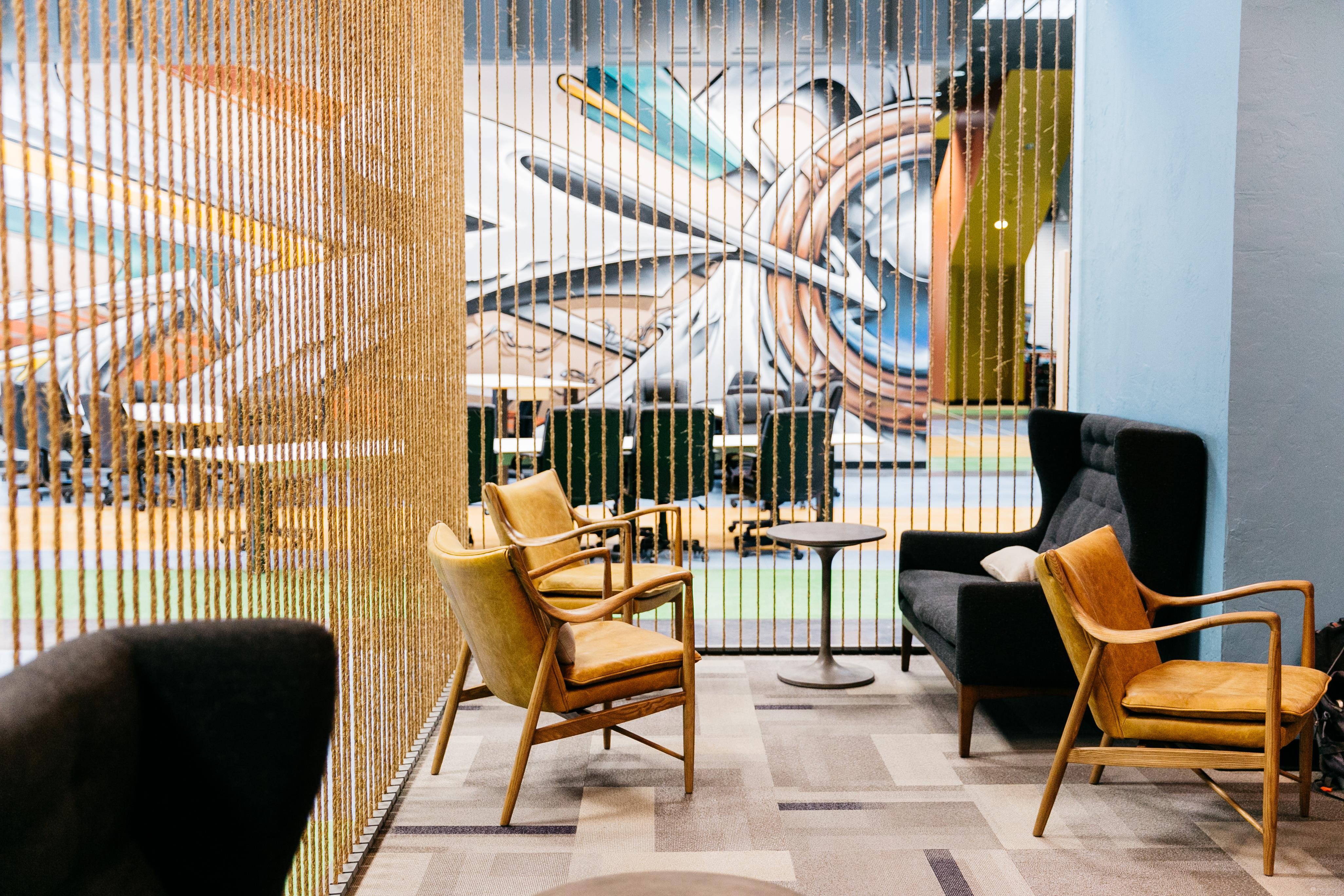
The New Hybrid Office Playbook, as tested by SF Bay Area Businesses.
The future of work has arrived. Here’s how to make it work for you.
Overview
Companies Like Uber, Netflix, and Airbnb Are Building a New Hybrid Office Playbook; Here’s How They’re Using Hyperlocal Coworking Spaces to Do It
The pandemic has forever changed the workplace. The past year and a half has proven that remote work can be successful, and for employees, there’s no going back.
In fact, workers would rather change jobs than return full-time to the office with nearly 40% of workers saying they’d consider quitting if their bosses weren’t flexible about working from home.
They’re not just daydreaming about their options, they’re taking action. In April alone, 4 million American workers left their jobs (a 20-year record!) and 3.6 million quit their jobs in May, many in search of better opportunities as part of 2021’s Great Resignation.
The Bay Area has become the testing ground for large companies to experiment with hybrid office work policies to head off this challenge. LiquidSpace has been working directly with large Bay Area tech employers like Acosta, Candid, and Here Technologies to build a playbook for new workplace models that can be adopted across the U.S.
One large biotech company based in San Francisco has used LiquidSpace to leverage local coworking spaces across the Bay Area over the past 4 years. Their goals were to create workspace alternatives to provide professional workspaces for their employees to work closer to home. In addition, they have even leveraged spaces in San Francisco when they had teams that have outgrown their campus.
LiquidSpace's own data shows an increasing demand for office space that is offered on a flexible on-demand schedule and in hyperlocal areas outside downtown city centers. Businesses see the value in offering flexible office space close to home as they've seen their employees move to more affordable suburban areas during the pandemic. Amid the Great Resignation, it's becoming a critical recruitment perk. Over the past few months, LiquidSpace has seen:
While companies delay their Return to Office (RTO), companies and their employees are leveraging local coworking spaces to get work done.
- Demand for Coworking Returns: In March 2020 the Covid Lockdown created a 72% drop in bookings in the SF Bay Area as of July 2020 as compared to July 2019. In July 2021 we saw a 274% increase on prior year and overall 78% recovery in demand to pre-pandemic levels in the greater SF Bay Area.
- Increase in Demand from Employees: As companies postpone RTO, their employees are leveraging coworking spaces: 32% increase in bookings by employees that work for large companies as compared to pre-pandemic.
Where we work in the SF Bay Area is shifting.
- Sacramento is Heating Up: Sacramento overtook San Francisco as the most booked city in the greater SF Bay Area per comparison of July 2021 vs. July 2019 booking data from LiquidSpace. Further, the Sacramento suburbs of Roseville, Folsom, and Citrus Heights all outpaced SF suburbs like Berkeley which experienced an 80% drop in demand since 2019.
- Rise of the East Bay: Oakland drops from 2nd to 3rd most booked city in SF Bay Area with the East Bay suburb of Pleasanton rising to the 4th most popular market ahead of both San Mateo and San Jose which are tied for 5th place.
- Peninsula Trends: In the Peninsula the suburban oasis of Burlingame and Foster City jumped into the top 3 most popular cities in the Peninsula alongside San Mateo, dropping Palo Alto from it’s top ranking pre-pandemic to 4th most booked city.
- Silicon Suburbs: San Jose retained its position as the Capital of Silicon Valley, but demand surged in Cupertino with 350% growth over pre-pandemic levels making it the 3rd most popular South Bay city after Milpitas.
“Going into a single-location office every day is no longer necessary or expected. Companies have nearly 18 months of evidence to bear that out—and more importantly, employees do as well,” said Eric Zellhart, VP of Product at LiquidSpace. “Flexibility has now become the perk of choice for employers to retain and lure top talent.”
Due to the high demand for hybrid work after months of working with its corporate clients to develop new hybrid work offerings, LiquidSpace has launched a host of new features for its LiquidSpace Enterprise platform to accommodate the growing needs of companies navigating this brave new world. Some of these features include:
- A custom solution for employees to seamlessly book drop-in office space at their convenience
- A workplace management dashboard businesses can white-label the booking platform, streamline payments, generate reports, and make real-time decisions with data and insights from workforce activity.
- Access to LiquidSpace’s network of over 10,500 hyperlocal coworking spaces across 2,700 cities.
Numerous Bay Area companies are using the new Enterprise platform, directly offering their employees one-click bookings for private offices, open desks, meeting rooms, and customized workstations.
LiquidSpace pioneered the “pay-as-you-go” model in 2011 to give professionals and companies the ability to access coworking spaces where and when they needed space without any commitment. The pandemic has accelerated the adoption of this model with local coworking partners adding more on-demand workspace options available with pay-as-you-go pricing for their members. Large companies are creating their own hybrid workplace strategies and need flexibility as they’re unsure of how much space they will need, when, and where.
“By forming a network across coworking operators, we’re able to support corporations in meaningful ways,” said Rebecca Pan, founder of Trellis Workspace in San Francisco. “In addition to cutting commute time and increasing productivity for employees, companies are saving a lot of money through consolidated HQs and a reduction in real estate footprint.”
“We are super excited about this new approach to broadening easy access to coworking spaces in the Bay Area,” Stine Jewett, general manager at Star Space in Sunnyvale. “Now, it can be part of the recruitment package that employees get to work near home in a productive and supportive environment.”
Having a network of available coworking spaces gives companies a variety of options to choose from as they plan their return-to-office (RTO) strategies. The hybrid model can include headquarters, working from home, and coworking spaces to give employees the flexibility to choose the space that fits their work needs.
“Developing these innovative new coworking models with LiquidSpace allows us to empower businesses and their people,” said Ali Elyassi, Investor and VP of marketing at Werqwise, a coworking space with locations in San Francisco and San Mateo. “Together, we help bring professionals together to make those meaningful connections that foster collaborations and innovation.”
"Distributed, flexible workspace is undeniably the future for a large part of today's workforce. LiquidSpace's early lead in bringing choice and competition to the enterprise market comes from years of working closely with independent operators like us, said Joel Pool, founder at The Port Workspaces, which operates three spaces out of Oakland. “We’re excited to work with LiquidSpace to bring this much-needed flex-office solution to Bay Area companies and their employees."
Employees feel the benefits are clear. "I enjoy being in the office, but working at headquarters isn’t always convenient. Right now I have to pay out-of-pocket to use coworking space," said one employee at a Fortune 10 company who has been working out of SF-based Trellis Workspace. "LiquidSpace Enterprise is a dream solution for employees to get the flexibility we need. I'm hopeful more companies, including mine, will adopt it!"
“Companies that empower their employees to be productive from anywhere, and think of the workplace as an enabler of not just productivity but also wellness, will have a huge competitive advantage in retaining and recruiting talent,” said Eric Zellhart.
Learn more about LiquidSpace Enterprise at www.liquidspace.com/enterprise, where any business can tailor their own hybrid workplace solution with a workplace management platform and global network of flexible office operators.
Ready to continue your journey?
There are two great ways to do it.
Ready to continue your journey?
There are two great ways to do it.






